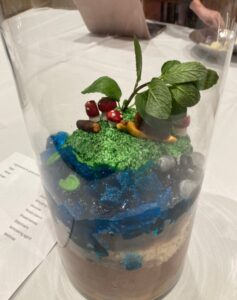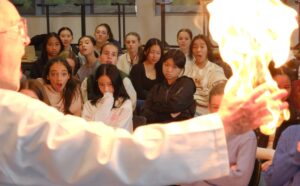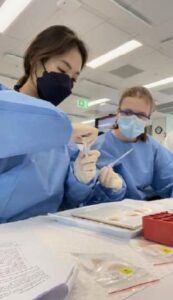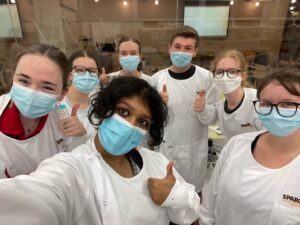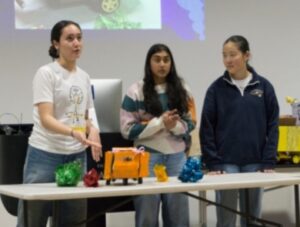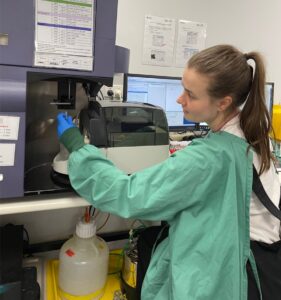Science Week 2024
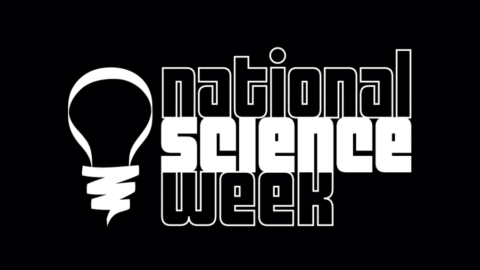
This year’s Science Week theme, Species Survival – More than Just Sustainability, explored some of the critical challenges impacting Earth’s human, animal, and plant habitation.
Science Week commenced at St Catherine’s with our inaugural Great Science Bake Off. Students were invited to make a cake, cupcake, biscuit or other food item with a science theme. The entries were outstanding, making it a tough choice for our teachers who cast their votes via secret ballot. Congratulations to the following place winners, all of whom were only one point difference from each other in the final tally:
Third Place: Zahra Hoban, Year 11 for ‘Terrarium’
Second Place: Danning (Rachel) Liu, Year 12 for ‘Scientific Calculator’
First Place: Amelia (Millie) Monahan, Year 9 for ‘The Earth’s Layers’
Other activities across Science Week included:
- Bad Science Show: Year 9
- Professor Bunsen Program: Years 7 and 8
- STEM Club: annual PPE Competition where students dress in their Personal Protective Equipment and perform challenging scientific techniques. Congratulations to STEM Captain, Zenan (Amy) Chen who took home first prize.
- Science Week Quiz: Congratulations to Opal Scheele, Year 10 for winning our 2024 Science Week Quiz
Our Science Week Assembly provided an opportunity to share the activities of St Catherine’s School scientists, many of whom may contribute to species survival in the future, aligning with this year’s Science Week theme.
Year 12 scientists Nadia Mohamed and Jisu Yang shared their experiences at the National Youth Science Forum at the University of Queensland during the Assembly. This select-entry science program aims to inspire more young Australians to engage in science and technology futures.
We were also able to acknowledge our Year 8 students’ participation in the Big Science Competition. The national competition tests students’ critical thinking and problem-solving skills as well as their science knowledge. Congratulations to Amber Lim, Taylor Plunkett, and Selina Peng who all received a Distinction Certificate placing them in the top 15% of the Competition.
Year 10 student Alexandria (Ally) O’Mara provided insights into her acceptance to the competitive Walter and Eliza Hall Institute’s Year 10 Work Experience Program, where she conducted experimental investigations into epigenetics at the Blewitt laboratory.
Victoria Bukharenko and Diya Asthana shared news on SuperHack, an annual engineering hackathon hosted by The University of Melbourne’s Electrical Engineering Club (MUEEC). SuperHack is a female-only Program for Years 10 and 11 students. Participants are invited from metropolitan and regional areas across Victoria to compete in teams to solve engineering design challenges based on a set theme.
Diya Asthana, Isabella Wang, and Maya Stokes chose to address coral bleaching, and designed a robot called Finding Nemo. The robot had a motor that allowed it to move in ‘tracking patterns.’ It also had colour sensors designed to take data on the colour of the coral and investigate whether coral was losing its colour because of coral bleaching. The robot was presented to a panel of judges (a combination of University of Melbourne students and industry experts) and saw the girls win second place.
Our Science Week Assembly also included a keynote address from St Catherine’s Old Girl, and SCOGA Fellowship recipient, Dr Alexandra (Ali) Dvorscek, a postdoctoral researcher at Monash University based at the Alfred Hospital. After officially graduating with her PhD earlier this year, Ali is now working in the Immune Memory Lab, investigating how we can enhance immune responses to vaccination. Early next year Ali will head to Imperial College in London to pursue an overseas postdoc position investigating immune responses to respiratory viruses.
Science Week ended with Astronomy Night presented by Rowina Nathan, PhD Candidate at Monash University conducting research as part of the LIGO Scientific Collaboration and the Parkes Pulsar Timing Array. Activities included a presentation on Astrobiology, exploration of the solar system with VR headsets, and exploring the night sky with our new telescopes.


